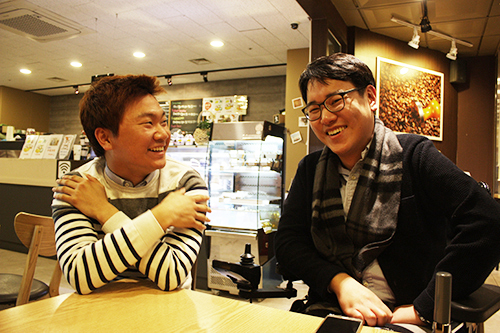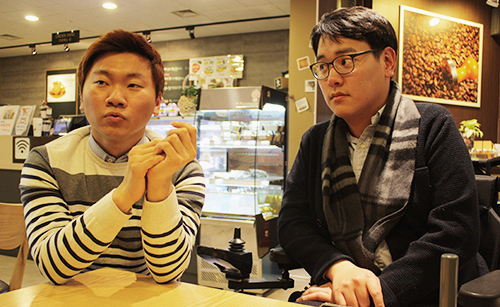Concerns from students will complete the better life of disabled students on campus
 | ||
| ▲ Lee Jeong-jun and Park Sung-jun are answering questions about Dongguk University's system for disabled students. | ||
| /Photograph by Kim Ji-seun | ||
In March 2016, the Ministry of Education announced its revisions to the Action Special Education for the Disabled Persons, etc. The purposes of this amendment include conducting research on the actual conditions of education and welfare for students with disabilities at universities and, based on the findings, solving problems of disabled students. Despite great attention to higher education and the rights of disabled students, some doubts have been expressed whether the reform offers practical plans to university students with disabilities or not.
Since 2010, the number of disabled students in university has been increasing annually by ten percent on average. According to statistical data from the Ministry of Education, there were 8,271 handicapped university students on campuses in 2014. With the increasing number of disabled students, organizations such as the government and schools have begun to provide several policies for them. The government established Action Special Education for Disabled Persons, allowing a person who has special needs to achieve self-realization and complete social integration by offering a proper education atmosphere. With the action taken by the Ministry of Education, over 300 universities throughout the country now have a facility for students with disabilities, which is called Support Center for Students with Disabilities.
In accordance with the special law, in 2005, a program called Helper for Students with Disabilities was placed by the Ministry of Education and Korea Student Aid Foundation. In 2016, the Ministry of Education declared its plans to draft 2,850 general and professional helpers and 25 remote helpers for students with disabilities. The system assigns two helping students per one student with disabilities on campus to provide assistance both academically and physically. Also, a student who is appointed as a helper receives a certain amount of financial support from the Korea Student Aid Foundation. There are two ways to select a helper for students with disabilities: students with disabilities recommend helpers directly or the school receives an application from other students. Students who are selected as helpers have to take specific training courses before starting the work.
There is not only support from organizations but also from students on campus. Many university students are interested in the issue regarding the rights of students with disabilities. With the attention, they set up clubs dealing with the rights of students with disabilities by themselves. Members of these clubs take a variety of actions to protect disabled students’ rights. For example, TurntoAble from Seoul National University (SNU) is a representative club that is actively engaged in asserting the rights of students with disabilities. In 2015, they demanded low-floor buses for students who are chairbound. Plus, it contacted the National Human Rights Commission of Korea and sued Central Library of SNU because the library did not reflect the demands to improve facilities for the disabled, despite TurntoAble’s requests.
Dongguk University also tries to help students with disabilities adjust to school life. As of 2016, there are 11 students with disabilities attending Dongguk. Like other universities, it possesses a Support Center for Students with Disabilities and implements the helper system. Heo Hyeon-sik, a section chief of the Support Center for Students with Disabilities, said, “Since there are quite a lot of students with disabilities at Dongguk University, the school and I try to offer as many systems as possible for them. Including the helper system, the school provides single dormitories for the disabled, three for males and two for females.” In addition, the school allows students with disabilities and their helpers to register courses earlier than the schedule of other students.
As there has been a special admission for students with disabilities since 1995, the number of students with disabilities on campus is steadily growing. Also, several programs for students with disabilities are operated by the government and schools. It indicates growing attention to students with disabilities, as an important first step. The section chief of Support Center for Students with Disabilities Heo mentioned, “Programs from the government and the school play important roles for students with disabilities to help them integrate into society. However, students’ consideration and attention are more important than anything else.”
 | ||
>> The Post interviewed a student with disabilities and a student serving as a helper.
Q. Hi, thank you for accepting the interview. Could you introduce yourselves?
Park Sung-jun (Park): Hello, my name is Park Sung-jun. I am a senior majoring in Law. I am currently receiving support from the helper system of the school.
Lee Jeong-jun (Lee): My name is Lee Jeong-jun, and I am a sophomore in the same major as Sung-jun. I am volunteering as a helper.
Q. How did you meet? What was the first impression on each other?
Park: We met in our freshmen year, 2013. I knew Jeong-jun’s name and face because we were taking the same class. One day, I was waiting for my laundry at the laundry room in the dormitory before going out. He came up to me and said that he would wait for my laundry and keep it in his room for me. I thought it was very nice of him for doing so.
Lee: Park’s first impression was also favorable. He seemed like a good person, so I wanted to help him.
Q. You have some benefits from the helping system for students with disabilities. What brought you to use the system?
Park: There is the Support Center for Students with Disabilities. When I was a freshman, the center suggested this program and asked me to choose one of my close friends as an assistant student. I recommended Jeong-jun.
Q. I am curious about your daily routine. Do you spend a lot of time together?
Lee: We are in different years, so we do not have classes in common. I usually help him in the mornings and evenings.
Park: Also, we meet at lunchtime and in-between classes.
Q. Is there any interesting experience you want to share?
Park: Jeong-jun frequently accompanies me when he goes out. We have been to the Han River and Namsan together. The moment I was most touched was when I had to go my hometown, and he came with me. That was my first time to travel a long distance with my friend.
Lee: Instead of a special experience with him, I want to say that I am always thankful for Sung-jun, because he is a good listener while we are having conversation.
Q. What is your opinion about the helping system for students with disabilities?
Park: I think it is a good program. To be honest, it is very difficult for me to ask others for help. One inconvenience about the system, though, is that letting other students substitute for the assistant student is forbidden, even in unexpected circumstances.
Lee: On the whole, I also have a positive view of the system. However, if the assistant student does not live in the dormitory with the student with disabilities, there is not enough time to help him. I feel sorry about that. In addition, all of the assistant students have to take online education about the system, which only covers the intention of the program and precautions. I think that education is a bit underdeveloped. I believe it should include more practical measures such as first aids.
Q. Do you think the support of Dongguk University for the students with disabilities is helpful?
Park: I am very satisfied with the school’s support. First of all, the staff of the Support Center for Students with Disabilities are friendly and attentive. Whenever I feel inconvenient related to the facilities, I can talk to him directly through Kakao Talk. He always tries to fix the problems as quickly as possible. Furthermore, some professors have changed the lecture rooms, so I can visit them more easily.
Lee: I feel relieved by what Sung-jun said. Also, I believed that Dongguk University offers a proper system for disabled students. However, if I need to talk about a problem which needs to be solved, I want to mention the concern of other students. For instance, students with disabilities do not have chances to join the events each department and major hold. I believe student councils ought to get down to this matter.

